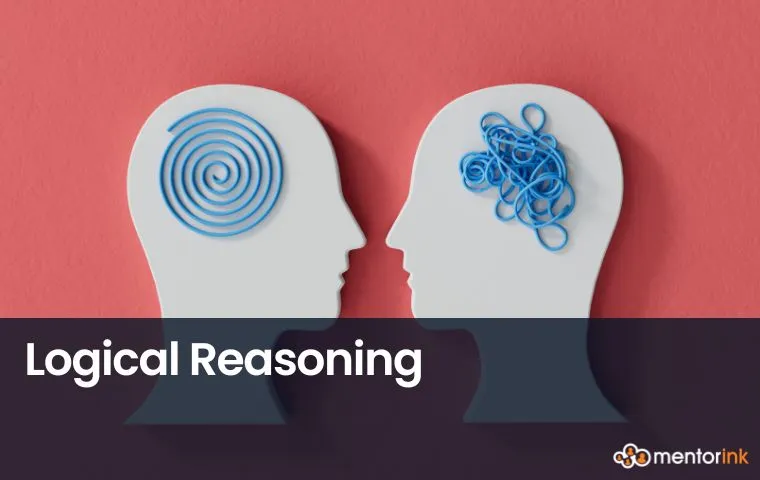
In the intricate tapestry of human cognition, logical reasoning can be defined as a cornerstone, enabling individuals to navigate complex scenarios, make informed decisions, and solve problems efficiently. Under this cognitive process, logical reasoning mostly covers the systematic evaluation of information, drawing conclusions based on evidence and structured thinking. When it comes to professional settings, logical reasoning is not merely an academic exercise but a vital skill that influences productivity, decision-making, and interpersonal relationships. As the modern workplace becomes increasingly data-driven and analytical thanks to AI tools, the ability to reason logically has transitioned from a desirable trait to an essential competency in the hiring environment.
What Is Logical Reasoning?
Logical reasoning can best be described as the skill to assess situations, recognize the connections between facts, and apply structured, rational thought to reach well-founded conclusions. It is about simplifying complex ideas, spotting flaws or gaps in arguments, and relying on solid evidence rather than intuition or emotion when making decisions. Unlike emotional reasoning, which can be influenced by feelings or bias, logical reasoning is rooted in objectivity, coherence, and clarity.
At its foundation, logical reasoning is what helps us judge whether something makes sense or not. It includes both deductive reasoning, where conclusions stem from established rules or principles, and inductive reasoning, which draws broader conclusions from specific instances.
People with strong logical reasoning skills tend to excel at solving problems, analyzing arguments, and thinking critically. While these abilities are especially valued in fields like law, science, mathematics, and business, they’re just as useful in everyday life for making better, more thoughtful decisions.
How Logical Reasoning Can Affect Your Work Performance
Logical reasoning plays a vital and far-reaching role in workplace performance. Employees who possess this skill are generally more capable of analyzing data, solving problems efficiently, and making sound, well-informed decisions.
To begin with, logical reasoning greatly enhances problem-solving. When challenges arise, employees with strong reasoning abilities can break down the issue, weigh different solutions, and choose the most effective path forward. This methodical approach not only boosts efficiency but also minimizes the chance of costly mistakes.
It also strengthens decision-making. By evaluating information impartially and anticipating possible outcomes, individuals are more likely to make decisions that reflect both strategic priorities and company values. This is particularly crucial in roles involving planning and the allocation of resources.
Logical reasoning also supports better communication in the workplace. When employees can explain their thought processes and the reasoning behind their choices, they are better able to express ideas, gain support from others, and work smoothly within teams. This level of clarity helps reduce misunderstandings and promotes stronger collaboration.
Lastly, it seems a key asset in navigating organizational change. As companies shift and evolve, logical reasoning helps employees assess new developments critically, understand their significance, and respond effectively.
All in all, integrating logical reasoning into daily work not only sharpens individual performance but also drives collective productivity and gives companies a competitive edge.
3 Best Ways to Improve Your Logical Reasoning
Strengthening logical thinking is not just for students or puzzle lovers. Improving the ability of logical reasoning should be a lifelong skill that benefits anyone, regardless of profession. One of the most effective ways to enhance this ability is by practicing problem-solving exercises regularly. These could include brainteasers, logic puzzles, or even strategic games like chess or Sudoku, all of which help train your brain to think more systematically.
Games
Games can be seen as leisure-time activities, and some adults see them as child activities. Not all games benefit logical reasoning. It depends on the category of the game.
Classic games like Sudoku and chess are good options. Some typical word games, such as Scrabble, Wordle, and the Strands game, are also beneficial for logical & strategic thinking.
But if you like computer games, you can find many strategy games. With the improvement of AI, there are so many challenging games that improve your logical reasoning in different ways
Reading
Critical reading is another useful strategy. Instead of just absorbing information, start questioning what you read. You can ask yourself why the author made certain arguments, what evidence supports them, and whether there are any gaps in logic. Over time, this builds your analytical skills and helps you spot weak arguments in any context. Reading is a good way to improve your logical thinking. But benefits of reading is much more than this.
Study Logics
You can also benefit from studying basic logic principles, especially if you are in a field that requires analytical decision-making. Understanding concepts like syllogisms, logical fallacies, or cause-and-effect reasoning can completely transform how you think and communicate. In your everyday conversations and decision-making moments, try to slow down and analyze your reasoning process. Ask yourself: is this conclusion based on facts or assumptions?
Can Mentorship Boost Logical Reasoning and How?
Mentorship also can be a major catalyst in developing logical thinking, especially when it is done intentionally. A good mentor does not just share knowledge, but they ask questions, challenge assumptions, and encourage critical thinking.
Through regular discussions and feedback, mentors help mentees move beyond surface-level understanding and start thinking more deeply about the “why” and “how” behind decisions and strategies. If you want to have conversation about logical thinking you should choose your questions in that sense. Our blog content about “Questions to Ask Mentor” can give you beneficial insights.
In a mentor-mentee relationship, real growth happens when the mentor guides the mentee through decision-making processes. Instead of simply providing answers, they walk through situations step-by-step, prompting the mentee to analyze various perspectives, assess the implications of choices, and predict potential outcomes.
This back-and-forth engagement acts as a live exercise in logic-building, which accelerates mental sharpness and fosters independent thinking.
Additionally, mentors often expose their mentees to new situations and problems that require careful analysis and creative problem-solving.
These are prime opportunities to develop the ability to evaluate data, recognize relevant variables, and prioritize options based on logical sequencing. As the mentee absorbs this thinking style, it becomes second nature.


